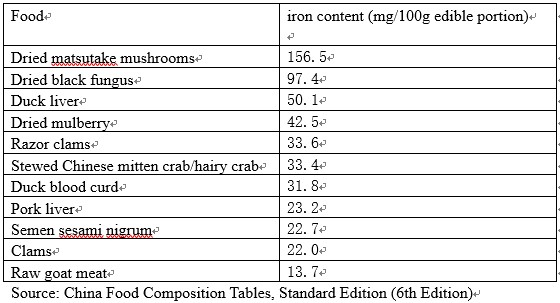How to increase iron intake during pregnancy
Iron as a micronutrient
Iron is an essential micronutrient of the human body. As a component of hemoglobin, myoglobin, cytochromes and certain respiratory enzymes, it plays an important part in the transportation of oxygen and tissue respiration processes, as well as in maintaining normal hematopoietic function and immune function.
During pregnancy, women experience an increase in blood volume and red blood cells, and the growth of both the fetus and the placental tissues requires iron.
Pregnant women are advised to consume iron-rich foods regularly to meet the increased demand for hemoglobin synthesis and fetal iron reserves, and to prevent premature birth and miscarriage. The recommended daily intakes of iron during the mid-pregnancy and late-pregnancy stages are 24mg and 29mg, respectively.
Dietary iron is divided into two forms: heme iron and non-heme iron. Heme iron is mainly found in animal-based foods and can be directly absorbed by the epithelial cells of the intestinal mucosa. It is deemed as a good source of iron for being not easily affected by phytates and oxalates and having a high absorption rate.
Non-heme iron, on the other hand, is mainly found in plant-based foods and needs to be converted to ferrous iron before it can be absorbed. It has a lower absorption rate due to the interference from phytates and oxalates.
Iron-rich foods

As shown above, animal blood and liver are rich sources of heme iron, which has a high bioavailability. Pregnant women can meet their increased iron needs by consuming animal blood and liver 1-2 times per week, with each serving being 20-50g.
In addition, vitamin C aids in the absorption and utilization of dietary iron. Therefore, it is highly advisable to pair iron-rich foods with vegetables and fruits that are high in vitamin C. For example, stir-frying 50g of duck blood with 150g of garlic chives can provide 16.8mg of iron and 36mg of vitamin C.
If a pregnant woman is already diagnosed with iron-deficiency anemia, she should promptly seek medical attention, and take iron supplements under the guidance of a doctor. She should also remember to increase dietary iron intake in daily meals.
Links
>
Copyright© Chinese Center for Disease Control and Prevention. All rights reserved.
京ICP备11024750号-1 京公网安备11011402013004号
京ICP备11024750号-1 京公网安备11011402013004号








